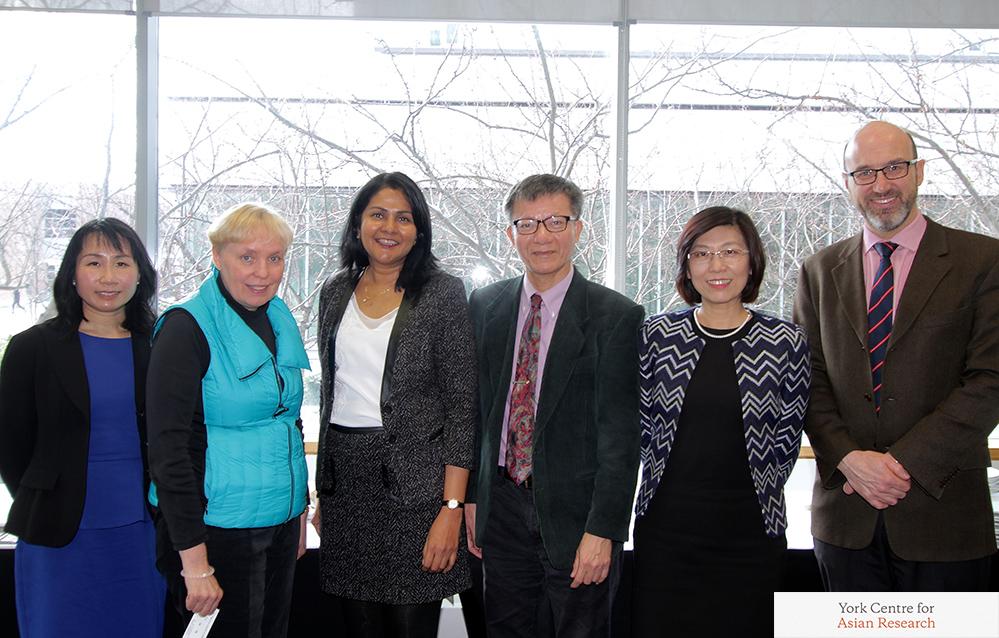Director General of Taipei Economic and Cultural Office, Toronto (Toronto TECO) Catherine Y. M. Hsu, accompanied by the Office’s Director Alice Wang, on Feb. 1 attended a seminar entitled “Natural Resources Management: National, Regional and Global Issues” and organized by the York Centre for Asian Research. The discussion, hosted by the Centre’s Director Philip Kelly, featured three distinguished panelists: Professor Der-yuan Maxwell Wu of National Chengchi University, Taiwan, York Univ’s Profesor Kathy Young (Department of Geography) and Course Director Venilla Rajaguru (Science and Technology Studies, Environmental Studies). During the panel discussion, the three scholars presented their researches on cases of resolving resource crisis and ecological governance problems in Mainland China, Taiwan, Canada and Austria. More than 60 faculty members and students participated in the event.
In her welcome remarks, DG Hsu told the audience that Taiwan’s diverse geography supports a resourceful ecological system that was gradually undermined by industrialization and urbanization during rapid economic growth. Fortunately, democratization created opportunities for the government to collaborate with the civil society to reassess local resource development and management, resulting in numerous successes. She believes that adopting an international and comparative perspective, the panel discussion would help promote opinion exchange and experience sharing. DG Hsu also thanked Professor Wu for traveling a long distance to Toronto to provide the seminar with a Taiwanese scholar’s viewpoint.
Professor Young, in the presentation of her research on the Canadian High Arctic, argued that while global warming has contributed significantly to dramatic melting of the world's glaciers, exploitation of oil, natural gas and minerals has threatened the traditional way of life and well-being of the Inuit people and the conservation of polar bears. During the presentation, Professor Young also attached importance to the process of policy communication.
Professor Wu then joined the discussion with the presentation of his research on the exploitation of water resources in Mainland China’s Sanjiangyuan Area, where three great rivers Yangtze River, Huang He (Yellow River) and Mekong River meet. According to Professor Wu, this case shows that great migration of local residents was often undertaken in the name of environmental protection, which in turn created impacts on transformation and adjustment of economic pattern. The case study indicates that there is a connection between public policy and public opinion and the linkage is of vital importance. In accordance with Professor Wu’s observation, no similar cases can be found in Taiwan, where option of reservoir-building is adopted to store water and prevent flood.
In her presentation, Course Director Rajaguru discussed the impacts of industrialization and agriculturalization on original ecological species in some parts of Austria and Canada. She treated these cases as examples to show that the consultation process should include the government, First Nations, environmental groups, mining companies and other stake-holders in order to prevent development-caused exploitation. Moreover, she also believed that joint resource management requires cross-bordered collaboration while resource development in one area needs to be in alignment with the national, regional and global agenda for peace, security and environmental protection.
All the participants of the event benefited from the conclusion reached by the three scholars that resource management has to take into account interests of local communities and the possible impacts on them. Some were in particular interested in the aspects of policy communication mentioned by Professor Wu in his presentation. After the Q&A period, some participants continued to exchange opinions with Professor Wu and DG Hsu.

Toronto TECO DG Hus (2nd from right) and Director Wang (1st from left), along with Director Kelly (1st from right), join panelists Professor Wu (3rd from right), Professor Young (2nd from left) and Course Director Rajaguru (3rd from left) for a group photo.